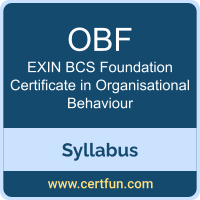 Use this quick start guide to collect all the information about EXIN OBF Certification exam. This study guide provides a list of objectives and resources that will help you prepare for items on the EXIN BCS Foundation Certificate in Organisational Behaviour (OBF) exam. The Sample Questions will help you identify the type and difficulty level of the questions and the Practice Exams will make you familiar with the format and environment of an exam. You should refer this guide carefully before attempting your actual EXIN BCS Foundation Certificate in Organisational Behaviour certification exam.
Use this quick start guide to collect all the information about EXIN OBF Certification exam. This study guide provides a list of objectives and resources that will help you prepare for items on the EXIN BCS Foundation Certificate in Organisational Behaviour (OBF) exam. The Sample Questions will help you identify the type and difficulty level of the questions and the Practice Exams will make you familiar with the format and environment of an exam. You should refer this guide carefully before attempting your actual EXIN BCS Foundation Certificate in Organisational Behaviour certification exam.
The EXIN OBF certification is mainly targeted to those candidates who want to build their career in Business & Service Management domain. The EXIN BCS Foundation Certificate in Organisational Behaviour exam verifies that the candidate possesses the fundamental knowledge and proven skills in the area of EXIN OBF.
EXIN OBF Exam Summary:
| Exam Name | EXIN BCS Foundation Certificate in Organisational Behaviour |
| Exam Code | OBF |
| Exam Price | $288 (USD) |
| Duration | 60 mins |
| Number of Questions | 40 |
| Passing Score | 65% |
| Books / Training | [Webinar] 'Striving for Business Analysis Excellence with Ian Richard' on September 1. |
| Schedule Exam | EXIN |
| Sample Questions | EXIN OBF Sample Questions |
| Practice Exam | EXIN OBF Certification Practice Exam |
EXIN OBF Exam Syllabus Topics:
| Topic | Details | Weights |
|---|---|---|
| Organizational principles |
- The candidate can… - explain delivering value.
- explain organization structuring.
- explain budgets and departmentalized businesses.
- describe types of jobs.
- describe line management, staff and functional relationships.
|
17.5% |
| Operating models |
The candidate can… - explain organization structures and their characteristics.
- recognize organizational boundaries.
|
15% |
| Organizational motivation, behavior and culture |
The candidate can… - explain organizational motivation (Object Management Group (OMG) business motivation model). - describe the organizational behavior field map. - explain organizational effectiveness and the balanced scorecard. - describe understanding and analyzing culture.
|
20% |
| Group formation |
The candidate can… - explain groups and group dynamics. - describe formal and informal groups.
|
10% |
| Principles of financial reporting |
The candidate can…
|
20% |
| Project finance |
The candidate can… - describe the rationale for and the techniques used for evaluating a financial case.
|
17.5% |
To ensure success in EXIN OBF certification exam, we recommend authorized training course, practice test and hands-on experience to prepare for EXIN BCS Foundation Certificate in Organisational Behaviour (OBF) exam.
